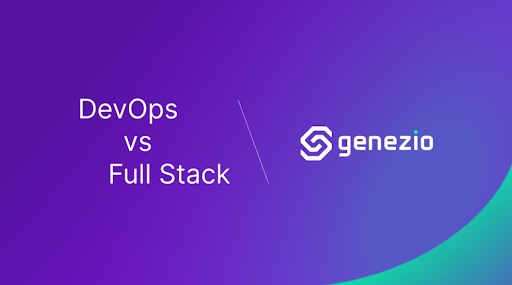When it comes to building software, you’ll often hear about DevOps vs Full Stack. But how do these two roles compare? Is one included in the other? For developers familiar with either, understanding the difference is important, especially when it comes to deployment and managing infrastructure.
According to the 2023 Stack Overflow survey, 33.48% of respondents identified as full-stack developers, while only 1.8% classified themselves as DevOps specialists. That’s a big gap, and it shows that most developers don’t focus on DevOps as a separate role. If you’re a full-stack developer, there’s no need to dive deep into DevOps to build and deploy an app — especially with the right tools.
In this article, we’ll break down the main differences between DevOps and full-stack development, explain where they overlap, and show how Genezio helps developers skip the complicated parts of DevOps while focusing on full-stack projects.
What do full-stack developers do?
Full-stack developers are responsible for building an entire webapp, from the front-end to the back-end. If you’re looking to strengthen your skills, consider enrolling in a full stack web development course for structured learning and practical experience.They work with various tools and technologies to design and implement user interfaces, databases, and APIs. At their core, they handle everything needed to create the app’s features and make sure it works well on both the client and server sides.
That said, full-stack developers are mainly focused on writing code. While they may have some experience with basic server-related tasks like configuring databases or setting up APIs, their biggest concern is the code itself. Because full-stack developers don’t typically get involved in the deeper operational aspects of app deployment, they would love a platform that allows them to quickly export their project and have it running. Or, in any case, they’d love to have a colleague that can deploy their app to the cloud. This is where the DevOps role comes in.
What is the role of DevOps specialists?
DevOps is a set of practices focused on improving collaboration between development and operations teams. While full-stack developers focus on building the app, the role of DevOps specialists is to guarantee the app works well in production. They handle tasks like automating deployment, managing server infrastructure, and making sure the app can scale and stay online.
In short, DevOps professionals take care of the operational side of the app, including containerization, monitoring, and scaling — tasks that full-stack developers usually don’t take on. And tasks that require permanent monitoring.
DevOps vs Full-Stack: how do they compare?
At first look, full-stack developers and DevOps specialists might seem to have overlapping roles, but they focus on different parts of the process. Full-stack developers write the code that makes the app work, both on the front-end and back-end. DevOps professionals handle the infrastructure, and make sure the app runs in production. In simple terms, one makes the code compile, the other makes it run under different conditions.
Of course, full-stack developers do work with back-end code, but that doesn’t mean they manage back-end servers. While they might configure APIs or databases, their main concern is building the app itself. DevOps specialists, on the other hand, focus on deployment, scaling, and keeping the app running securely in real-world conditions. They do write code, but it’s mostly for automating infrastructure and making sure other code runs properly.
Though the two roles complement each other, juggling both can make it tough to succeed in either. It’s difficult to be great at both full-stack development and managing all the operations (not impossible, though — plenty of developers have mastered it). If you’re curious about both, joining a startup as a full-stack developer might give you a chance to dip into DevOps.
But remember, trying to master both can stretch you thin. Instead, with the right cloud platform, you can focus on the app and leave the operations to someone else. Genezio, for instance, is a full-stack cloud platform that lets you skip the technicalities of DevOps and just deploy your app without worrying about the infrastructure.
Deploy your serverless app, now →
How Genezio helps full-stack developers skip DevOps
Deploying an app shouldn’t mean getting stuck with server setups and scaling concerns. But in practice, it often involves a long list of operational tasks, which can take up hours that could be spent on development. (If deploying doesn’t take hours, then scaling or monitoring will surely do). Genezio takes care of that overhead. It’s a specialized cloud platform that handles deployment for you, so you can focus on building your app.
All you need to do is connect your GitHub repository with Genezio. Once your project is imported, the platform detects the framework you’re using and automatically applies the necessary build and deployment settings. You can customize these settings if you have to, but for the most part, it’s set up to work with minimal setup.
Once you’re ready, just click to deploy. Genezio takes care of the rest, handling server management, scaling, and updates. Every time you push a change to your GitHub repository, Genezio redeploys your app automatically. It’s as simple as that. No need for DevOps expertise or worrying about your app going down during traffic spikes. You can sit back and focus on writing more code and building cool new features.
What happens if there’s no DevOps specialist?
If you’re a full-stack developer without experience in DevOps, you might wonder what happens when your app needs to scale or be maintained over time. Do you need to manage the infrastructure yourself?
The answer is: No. With platforms like Genezio, you don’t have to worry about managing servers, handling traffic spikes, or keeping your app available to users. Genezio is serverless, which means it takes care of scaling and maintenance for you. Serverless means that there are servers, but that a provider takes care of those for you.
So, if you don’t have a DevOps specialist on your team, it’s okay. Genezio handles the entire backend infrastructure, and lets you can focus on coding and building your app. You’re still in control of development, but you don’t have to deal with server management — Genezio does that for you.
Why Genezio is the best solution for full-stack developers
For full-stack developers who don’t know DevOps or don’t have a DevOps specialist on their team, Genezio takes care of the infrastructure. There’s no need to set up servers, manage uptime, or handle scaling. Genezio sorts that out.
As a serverless platform, Genezio gives you everything you need to launch your app, all within its free starter plan. You can go live without extra configuration. Just connect your GitHub repository, and your project is ready in a few clicks.
Sign up for Genezio now. It’s free and it takes seconds.
If you’re looking for a simple way to deploy and scale your app without dealing with DevOps, try Genezio for free at Genezio.com and start deploying today.



































